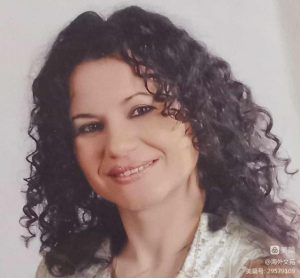诗人曰:真理无法言喻,沐浴在神圣火焰中【世界诗人荟萃】
海外文苑


23年28期
主编:佩英
顾问: Anna惠子 廖世敬 曹谁
本期翻译:佩英

沙希德·阿巴斯,巴基斯坦作家和诗人。他是《自然之词》的作者,也是《我们以音节言语》的合著者。他的作品在国际选集和各种印刷和文学平台上发表,被翻译成10种不同的语言传播。

关于自然
原文:沙希德·阿巴斯(Shahid Abbas )
汉译:佩英
大自然是美丽的母亲,是无尽魅力的家园。没有它,所有的形式都会因缺乏装饰而显得狡猾,这是无价的恩赐,也是老天的美好祝福。它存在于每个文化的文学作品中。它撑托情节,助我们了解原形。世界赋予丰富美丽的自然资源,是创作美好诗歌和散文的灵感,可成为经典之作的永恒主题。正如伟大的诗人约翰·济慈所说:“大地的诗歌永不消亡”。莎士比亚也曾说过:“一点自然之情使整个世界亲如一家”。
随着全球气候变暖的威胁,我们有责任看护自然。
[xyz-ihs snippet=”In-article-ads”]自然是尘世之身的灵魂。作为人类,我们如何以微小的方式,维护自然呢?自然展示了和平、宁静、力量和坚强。一些作家视其为通向独立之路。古人以自己的视角看待自然。例如,把地球看作是一个女人,她的愤怒会带来地震。
威廉·布莱克也谈到了自然的重要性,他说:“对一些人来说,一棵让人欢欣鼓舞的树,在其他人眼中只是一个挡道的绿色物体。有人看到的是自然的荒谬和畸形……而有人则几乎看不到自然。但对于富有想象力的人来说,自然就是想象本身。”
在诗歌中,自然是浪漫主义诗人的宗教。其中的愉悦,让诗人们发现生命的奥秘。威廉·华兹华斯在自然中寻找上帝,并说:“走出来,到事物的光明之中,让自然成为你的老师。”在他的诗《廷特恩修道院》中,他进一步说道:“自然从未背叛过那颗热爱她的心。”
塞缪尔·泰勒·科勒德认为大自然带有超自然的元素。他说:“它以蜜露为食,饮过天堂的奶。” 伟大的浪漫主义诗人约翰·济慈说:“世界上没有一只鸟,没有被它在心灵上留下影子。” 对于济慈来说,自然是他最好的朋友。
作家和艺术家都使用天空作为宁静的象征和神灵的居所,它也展示了神圣的力量。蓝天被描绘为幸福和宁静的象征。夜晚的天空象征死亡和邪恶力量,厚重的云层带来深深的悲伤。
美丽的彩虹在雨后浮现,蕴含着希望和崭新的明天;这是神圣庄严的承诺。在文学中运用自然,就如同找到一个“难以找到的好人”。
奥康纳(O’Connor)认为天空中没有什么,不过是宗教的想象罢了。这意味着并无上帝,人类别指意神的救赎。太阳是神话中常用的符号之一,它为每个人赋予生命,也展现出力量和神力。日出象征着希望,而日落揭示生命的终结。例如,在小说《克拉拉和太阳》中,’克拉拉可以透过窗户看到太阳的升起和落下,她相信这给予她滋养。

水也是一种在不同作品中使用的传统符号。它描绘了重生、力量、混沌和危险。海洋展示生命,也是洗净罪恶的洗礼仪式象征。在小说《罪与罚》中,水代表了生命和重生,对不同的角色有不同的含义。对于积极的角色,它象征着生命和成长。对于负面角色,水通过死亡的威胁使他们感到恐惧。
另一种运用大自然的文学手法是森林。对于人类来说,森林总是充满危险,人们相信其中栖息着黑暗的力量,因此它们常常表达迷失、受到威胁和神秘的意境。
“我去了森林,因为我想有意识地生活,我想生活得深刻,吸取生命的全部精华,排除一切非生命的事物。我不想等到临死时才发现我并没有真正活过。” – 亨利·大卫·梭罗
大自然是造物主给我们最重要的恩赐……太阳、月亮、树木和动物一一具备。大自然也为我们提供食物、氧气、水、庇护所,以及药物。
毫无疑问,我们应该呵护大自然,因为她也在保护我们。因她的关爱,我们才能够活着、充满动力并葆有健康。宇宙是一个天堂。人类日新月异,试图抵达其他星球,但却忽略了我们唯一的家园。贪婪的行为,在破坏它的纯洁。如果我们不呵护这份来自造物主的无价之宝,我们将成为未来世代的罪人。不幸的是,我们对不保护自然的危险依然懵懂,因果相续,我们将自食其果。
珀西·比希·雪莱在《今日微笑的花》中写道:
“今天微笑的花/明天就凋谢/我们所期望留存的一切/诱惑而来飞逝而去/世界的欢愉是什么?/是闪电,嘲笑着夜/稍纵即逝却无比辉煌。”
生命之光。它表达了人类复杂的情感世界,爱恨交集。

About nature
by Shahid Abbas
Nature is the Mother of all beauties and home of unlimited charms. Without it, all genres are foxy with the absence of ornaments and this is something which is a priceless boon as well as the bountiful blessings of the Almighty. It exists in the literary works of every culture. It is the backbone of plots and also helps us to learn about the original image. The world is endowed with rich beauteous natural resources which can all be inspirations to compose lovely poetry and prose and to even be the eternal subjects of masterpieces. As the great poet, John Keats says: “The poetry of the earth never died”. Shakespeare also stated before that: “One touch of nature makes the whole world kin”.
With the increasing threats of global warming it’s our responsibility to take care of NATURE.
Nature is the soul of the worldly body. How can we as humans help nurture nature in our own little ways? Nature shows peace, calmness, power, and strength as well. A few writers consider it as a path for independence. The ancient people took it with their own perspectives. For instance, the Earth refers to a woman whose anger brings earthquakes.
William Black also talked about its importance and said: “The tree which moves some to tears of joy is in the eyes of others only a green thing that stands in the way. Some see nature all ridicule and deformity… and some scarce see nature at all. But to the eyes of the man of imagination, nature is imagination itself.”
In poetry, nature is a religion for Romantic Poets. There is pleasure that exists in it, and they discover life secrets in her. William Wordsworth seeks God in nature and said: “Come forth into the light of things, let nature be your teacher.” He further said in his poem ‘Tintern Abbey’- “Nature never did betray the heart that loved her”.
S. T. Coleridge perceives nature with supernatural portions. He stated: “For he on honey-dew hath fed, and drank the milk of Paradise.” John Keats the great Romantic poet says: “No bird has left in the world, which has not left an influence on his mind”. For Keats Nature is his best friend.
Both writers and artists use sky as the symbolism of calmness and the dwelling of gods, it also shows the Divine forces. The blue sky is portrayed for happiness and serenity. The sky at night presents the picture of death and evil forces and the heavy cloud formations bring sadness to the core.
The lovely rainbow after the rain connotes hope and a brand new tomorrow; a solemn promise of the Divine. Using nature in Literature would be like a Good Man who is ‘Hard to Find’.
O’ Connor perceives that there is nothing in the sky, it’s religious imagery in it. It means that there is no God, and that humanity cannot hope for salvation. Sun is another common symbol which is used in Mythology. It gives life to everyone. It also shows power, Divine forces as well. The sunrise shows hope whereas, the sunset exposes the end of life. For example, in the novel Klara and the Sun, ‘Klara can see outside the window to watch the rising and setting of the Sun, which she believes gives her nourishment.’
Water is also a traditional sign which is used in different works. It depicts rebirth, power, chaos, and danger. Sea also shows life. This is also a symbol of the rites of baptism that washes away sins. Water in the novel Crime and Punishment comes to represent life and renewal and has different meanings for different characters. For positive characters, it connotes life and growth. Whereas, water terrifies negative characters with its threat of death.
Another literary device using nature is the woods. Woods are always dangerous for human and people believe dark forces live among them, therefore they express being lost, endangered, and mysterious as well.
“I went to the woods because I wanted to live deliberately, I wanted to live deep and suck out all the marrow of life, to put to rout all that was not life and not when I had come to die, discover that I had not lived.” -Henry David Thoreau
Nature is the most vital boon of God. It fulfills our desires. With the increasing threats of global warming it’s our responsibility to take care of it. It’s our home and many creatures live and thrive for our benefit. God creates all things for us. Everything like the sun, the moon, trees, and animals. She provides us food, oxygen, water, shelter, and medicine as well.
There is no doubt that we should nurture Mother Nature because she does protect us, too. Because of its love we are alive, motivated, and healthy. Our universe presents paradise. Human beings are making progress and trying to reach other planets but they have ignored our only home. Due to our greedy behavior, we are spoiling its purity. If we don’t take care and preserve it, the priceless gift of the Almighty, we will be the killers of our future generations. Unfortunately we are unaware of the dangers of not protecting nature and so we reap what we sow.
P. B. Shelley’ writes in “The Flower That Smiles To-Day”:
“The flower that smiles to-day
To-morrow dies;
All that we wish to stay
Tempts and then flies.
What is this world’s delight?
Lightning that mocks the night,
Brief even as bright.”
of life. They also express varied human feelings, like love and hate.

安东尼奥·贝纳德·玛阿特来自菲律宾,是一位多产的年轻作者,拥有超过100本国际合著的书籍,其中包括《世界母亲》。他曾在多个国际写作比赛中获得第一名,并被认为是世界前十位当代作者之一。安东尼奥还通过提供免费研讨会和担任尼日利亚作家全球运动的执行董事,为写作团体做出贡献。他的作品曾在土耳其的圣卡鲁(Sangurlo)等国际刊物中亮相,并获得了来自菲律宾诗人协会颁发的“菲律宾鹰奖”(Gawad Agila)。安东尼奥对写作的执着和对他人的激励使他在文学界脱颖而出。
[xyz-ihs snippet=”GoogleADresponsive”]思绪徜徉
原文:安东尼奥·贝纳德·玛阿特
汉译:佩英
奇境,
隐藏大自然的秘密,
花朵寂静中绽放,树木骄傲地呼气。
山峰激荡,因信仰之拥抱,
云朵舞动于无形的喜悦,
奇迹绽放于未被触及之所,
一场圣洁的永恒的吻。
昼逝,
思绪如交响乐般飞翔,
一团星云般的思想,在夜幕中闪烁。
遥远的星辰,
隐匿于深邃的暗影中,
正在空气中闪烁,
神秘悄然渗透。
于文字的织锦,
我倾洒心之渴望,
然而,有些真理无法言喻,沐浴在神圣的火焰中。
我灵魂低吟诵,其意义,
连我自己都不得而喻,
但问题回响,于一场无穷无尽的探寻中。
WONDERING MIND
By Antonio Bernard Ma-at
In the realm of wonders,
where nature’s secrets hide,
Flowers unfurl in silence, trees exhale with pride.
Mountains stir with faith’s embrace,
clouds dance in unseen bliss,
Marvels unfolding in realms untouched,
a divine eternal kiss.
As daylight fades,
a symphony of thoughts takes flight,
A nebula of ideas, flickering through the night.
Like a distant star,
veiled in shadows deep,
It sparkles within the very air,
where mysteries quietly seep.
In a tapestry of words,
I pour my heart’s desire,
Yet, some truths elude description, engulfed in a sacred fire.
The purpose of my soul’s whispers,
I cannot fully comprehend,
But they echo with questions, in a search that knows no end.

卡罗琳·纳扎雷诺-加比斯(Caroline ‘Ceri Naz’ Nazareno-Gabis)是《天鹅绒激情》的作者,同时也是加拿大国际诗歌驻菲律宾主任。她是一位备受赞誉的诗人、科学教育者、和平和妇女权益倡导者。她的诗歌获2023年”加布里埃尔·加洛尼”(Gabriele Galloni)奖、2020年”全景”(PANORAMA)青年文学奖。她是菲律宾塔尔拉克农业大学艺术与科学学院的教师。
隐藏的珍宝
原文:卡罗琳·纳扎雷诺-加比斯
汉译:佩英
你启程去赢得和获取
永恒之记忆,
兴奋捕捉
每当大自然呼唤,
从扫过的蜿蜒曲线,
从郁郁葱葱的绿意中,
从硫磺弥漫,令人陶醉的海岸中
从亲密的圣殿,
它滋养并净化
受伤的灵魂,
来自各种身世背景的人们
曾到过彼此此地的人们
他们已迷失,
但从未被抛弃;
永远 你都是
来自文字森林里的珍宝。
Hidden treasure
By Caroline ‘Ceri Naz’ Nazareno-Gabis
You left to win and gain
Lasting memories,
Exhilarating captures
When nature calls,
From sweeping meanders,
From the lush of greens,
From the sulfuric smell
Of the enthralling coast,
From the intimate sacred chamber,
That replenishes & sanctifies
Wounded souls,
From all walks of life,
Been here and there,
Sometimes lost,
But never forsaken;
For always
You are the treasure
From the forest of words.

斯柯达·默罕默德·齐利亚(SHIKDAR MOHAMMED KIBRIAH),孟加拉双语诗人,作家、评论家、翻译家、和平大使和哲学家。他乃“诗歌与文学世界愿景”创始人和主席。他已出版18本书,作品被翻译成40多种语言传播,是世界和平、爱和人道主义全球大使。是一位被全球认可的孟加拉代表诗人。
一片忠实的护体
原文:斯柯达·默罕默德·齐利亚
汉译:佩英
一片忠实的护体
可以是一项研究
一场富有想象力的梦幻工程
平直输出的
可以是一幅优美的风景画
一件来自高贵灵魂的雕塑或
闪耀着月光的头骨
静如月华
在神经网络中发出逻辑信号
我将自信地站在黑格尔面前,
打开一个辩证法的网站
我将真诚地告诉你
这不是谎言
在蔚蓝的天空中
有一只风筝独自入眠
在白云的枕上。
它被一些不可思议的梦境抚慰
获得了综合的宁静。
最后环绕的
是一个无穷无尽的空间里极度的喜乐
一种永恒的存在
A Piece of Faithful Cover
By Shikdar Mohammed Kibriah
A piece of faithful cover could be a study
Of an imaginative dreamy-project
For horizontal outgoing.
Like an outstanding painting of a landscape,
Luxurious mental sculpture or a shining
Of nerval moonlight in the skull
Alike a tranquil moon.
If clicks any logical signal in nerval internet
I will confidently stand at Hegel and open
A dialectical website.
I will trustfully tell you it was not a lie at all
That in deep blue sky a kite alone slept
In a sleep with a pillow by white cloud.
It was fondled by some impossible dreams
And got a synthesized relax
Finally started to go a good round
In the space endless with an extreme joy
Of eternal existence.

贾克汗吉尔·诺莫佐夫(Jakhongir NOMOZOV)于1997年1月24日出生在纳曼干地区的波普区。他是乌兹别克斯坦国际作家工作组的协调员,土耳其国家电子杂志《诗之宝库》( SIIR SARNICI)在乌兹别克斯坦的代表,哈萨克斯坦共和国艺术家国际协会“共享领域“(Kosh Kyang)会员,乌兹别克协调员。
[xyz-ihs snippet=”googleAD300x100″]苦恸
原文:贾克汗吉尔·诺莫佐夫
汉译:佩英
爱已溶入骨血,
我情不自禁唱起爱之歌。
我写的每一首诗
都是我对真理的誓言。
你在我眼中看到的火花
是从天堂来的光芒,
而我心中绽放的愿望
是一种你从未见过的奇迹。
我的希望永不凋零,枯萎,
春天让灵魂繁茂。
一种巨大的苦恸
让骨血无比昌盛。
我是由造物主的爱所创造的
命哦,你我是谁?
弱小之躯,狭小的胸膛
可知埋藏多少禀赋与爱?
命哦,可知我是谁?!
PAIN
By Jakhongir NOMOZOV
Love is absorbed into my body,
I cannot help singing a love song.
Each of these poems that I wrote
Is an oath I gave to the truth.
The sparks you see in my eyes
Are the lights come from Heaven
And the wishes bloomed in my heart
Are the mirabilis you have never seen.
My hope will never wither, dry up
Spring always flourish my soul.
There is a great pain which is able to
Flourish my veins and bones at all.
I was made from love of The Almighty
Does the life know who I am?
In my tiny body, in my little chest
How much talent and love do I have?
Does the life know who I am?!

安吉拉·科斯塔(Angela Kosta)1973年出生于阿尔巴尼亚,作家,诗人,翻译家。1995年后居住意大利。安吉拉已出版9本书,有小说、诗歌和童话,涵盖阿尔巴尼亚语和意大利语。她是《新视窗》报(DRITARE E RE )总编,国际报纸《阿尔巴尼亚快讯》(Albania Press)副主编。其作品发表在阿尔巴尼亚、科索沃和意大利多个文学杂志和报纸上。此外,她还为意大利报纸《Calabria Live》撰写文章,为阿尔巴尼亚《根源报》翻译,为国际杂志《俄耳甫斯》撰稿,为意大利”今日亚历山德里亚市”撰稿,并与国际杂志”阿图尼斯”(Atunis)(比利时、希腊、黎巴嫩、匈牙利等)合作。
一片面包……
原文:安吉拉·科斯塔
汉译:佩英
一片面包
为了解渴
日夜间;
一个人悲伤的存在,在呼喊,
在寻找一阵子后,失败了,
投胎在残酷的命运,这是谁的错?
该抱怨的是自己吗?
难道是自己天生不受欢迎的命吗?
难道自己投胎到一个错误的世界吗?
无法满足的饥饿感,
世人的漠视
消失的欢愉……
我梦想生活在云端,
在宇宙中呼吸空气; 可
太阳的炙热仍然不足以融化,兄弟冰冻的血液和渐弱的心跳。
脚下的这片地啊;
哪里,可寻得一片面包, 千万别崩溃!
全能的耶稣你在哪里?
无解! 一片面包,就是我全部身家性命。
A PIECE OF BREAD…
By ANGELA KOSTA
A piece of bread
To quench the hunger
For day and night;
A person shouts out for a sad existence,
Searches for it, but fails and finishes in a while.
Being born with the cruel fate, whose fault is it?
Am I to blame myself?
Were we unwanted?
Did we get into the wrong world?
Insatiable hunger,
public negligence,
disappearance of rejoice…
I want to live in clouds and fill myself with air in the universe;
Still the heat from the sun is increasing not enough to melt the frozen blood and faded heartbeats of my brothers.
The ground beneath your feet;
Where a piece of bread,
Don’t fall apart!
Where is the Jesus who takes care of all?
There is no answer!
I have the piece of bread only except my wealth here.

译者简介:佩英,新西兰硕士,双语诗人,报纸专栏作家。

新西兰 澳纽网出品
编辑:小图
[xyz-ihs snippet=”multiple-ads”]
654 views





